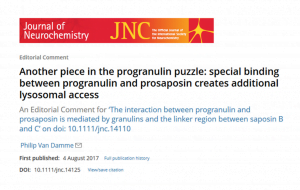The development of Parkinson’s disease is linked to an overabundance of the protein alpha-synuclein, which is found mainly at the end of neurons in what is called the nerve terminal. Since the link was first discovered in the 1990s, researchers have been working to precisely identify its role in Parkinson’s disease.
Now scientists have found that alpha-synuclein hinders a key step involved in the transmission of neuronal signals, which is essential for higher-brain functioning: vesicle endocytosis at the nerve terminal.
The study was published in the Journal of Neuroscience.
Neurotransmission is a process that allows neurons to pass signals between one another — signals important for motor, sensory, and cognitive functioning. When an electrical signal arrives at a nerve terminal and needs to be passed along to the next neuron, neurotransmitters packed in vesicles mediate this process. After being released, the neurotransmitter is caught by receptors in an adjacent neuron and the signal is passed along for further transmission. Meanwhile, the empty vesicle is recycled back into the nerve terminal to be used again.
The retrieval of an emptied vesicle membrane is called ”endocytosis,” and it is this process that an overabundance of alpha-synuclein disrupts. Endocytosis is critical for proper neurotransmission — when it is inhibited, the rest of the steps involved in transmission are affected as well.
High-frequency transmission, in which vesicles are heavily used, is important for processes such as sensory perception, generating memories, and motor control. The researchers found that when endocytosis is inhibited, high-frequency transmission breaks down much more quickly than it would under normal circumstances.
A deeper look into the mechanism by which alpha-synuclein inhibits endocytosis revealed toxic effects of the over-assembly of microtubules. Too much alpha-synuclein in the nerve terminal causes microtubules to over-assemble and somehow get in the way of endocytosis.
Researchers believe that this inhibitory process caused by an overabundance of alpha-synuclein is what occurs in the early stages of Parkinson’s disease, before morphological changes such as the loss of function and death of neurons begins.
Paper: “Wild-type monomeric α-synuclein can impair vesicle endocytosis and synaptic fidelity via tubulin polymerization at the calyx of Held”
Reprinted from materials provided by Okinawa Institute of Science and Technology Graduate University – OIST.



 ”Inhibition of γ-Secretase Leads to an Increase in Presenilin-1
”Inhibition of γ-Secretase Leads to an Increase in Presenilin-1
